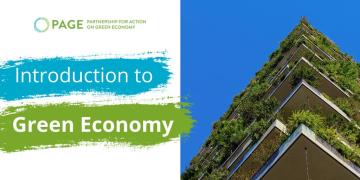
This course, Introduction to Green Economy, introduces people to the basic concepts, policy instruments, and international frameworks of inclusive green economies. The course is self-paced, with ten hours of materials. The syllabus can be found here.
After completing the course, learners will be able to:
- Describe the rationale and core concepts for realizing an inclusive green economy against business-as-usual practices
- Identify enabling conditions for greening national economies
- Outline principal opportunities and challenges in key sectors
- Provide examples of national strategies and plans to advance an inclusive green economy
- Distinguish international frameworks and initiatives in support of an inclusive green economy
The course is structured into five modules:
- Understanding where we are – The rationale for advancing an inclusive green economy
- Focusing on the instruments – Enabling conditions for structural change
- Sighting the destination – Key sectors with high greening potential
- Devising a pathway – Strategies and planning for reaching policy objectives
- A helping environment – International frameworks and initiatives to support an inclusive green economy
This e-course has been developed under the umbrella of the Partnership for Action on Green Economy (PAGE). PAGE brings together five UN agencies – UN Environment, International Labour Organization, UN Development Programme, UN Industrial Development Organization, and UN Institute for Training and Research – whose mandates, expertises, and networks combined can offer integrated and holistic support to countries on inclusive green economy. The course is hosted on UN CC:e-Learn.
